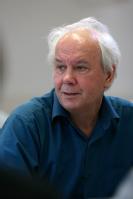Think uncertainty is a bad thing? It’s actually a mark of sound science.
 Professor Ian Stewart, Emeritus Professor of Mathematics at the University of Warwick, has contributed to a new guide challenging the idea that uncertainty in research is a reason for people to worry about the reliability of findings.
Professor Ian Stewart, Emeritus Professor of Mathematics at the University of Warwick, has contributed to a new guide challenging the idea that uncertainty in research is a reason for people to worry about the reliability of findings.
Researchers in climate science, disease modelling, epidemiology, weather forecasting and natural hazard prediction say that we should be relieved when scientists describe the uncertainties in their work. It doesn’t necessarily mean that we cannot make decisions – we might well have ‘operational knowledge’ – but it does mean that there is greater confidence about what is known and unknown.
The guide, entitled Making Sense of Uncertainty, was launched at the World Conference of Science Journalists. Researchers working in some of the most significant, cutting-edge fields say that if policy makers and the public are discouraged by the existence of uncertainty, we miss out on important discussions about the development of new drugs, taking action to mitigate the impact of natural hazards, how to respond to the changing climate and to pandemic threats.
Interrogated with the question ‘But are you certain?’, they say, they have ended up sounding defensive or as though their results are not meaningful.
Instead we need to embrace uncertainty, especially when trying to understand more about complex systems, and ask about operational knowledge: ‘What do we need to know to make a decision? And do we know it?’ In Making Sense of Uncertainty they review the current discussion and discuss:
• The way scientists use uncertainty to express how confident they are about results.
• That uncertainty can be abused to undermine evidence or to suggest anything could be true: from alternative cancer treatments to anthropogenic CO2 not changing the atmosphere.
• Why uncertainty is not a barrier to taking action – decision makers usually look for a higher level of certainty for an operational decision (such as introducing body scanners in airports) than for a decision based on broader ideology or politics (such as reducing crime rates).
Tracey Brown, Managing Director, Sense About Science, said: “Scientific research doesn’t just produce information – about earthquake frequency or the causes of cancer - it estimates how much of the picture we have by trying to measure the uncertainty in that information. However, this does not mean that we are waiting for the day of certainty to arrive! It is especially important to recognise that in discussions where we have decisions to make, about whether to spend more on buildings that withstand earthquakes and whether to stockpile a vaccine. Instead, ‘do we have operational knowledge?’ is one of the most useful questions anyone can ask.”
Ian Stewart FRS, Emeritus Professor of Mathematics, University of Warwick: “I prefer the honest uncertainties of science to the hollow certainties of people who ignore any evidence that does not fit their beliefs.”
ENDS
The guide can be downloaded here 
For print copies email publications at senseaboutscience dot org
To speak to Professor Stewart please call Anna Blackaby, University of Warwick press officer on 02476 575910 or a dot blackaby at warwick dot ac dot uk
The guide can be downloaded here
For print copies email publications at senseaboutscience dot org
To speak to Professor Stewart please call Anna Blackaby, University of Warwick press officer on 02476 575910 or a dot blackaby at warwick dot ac dot uk
